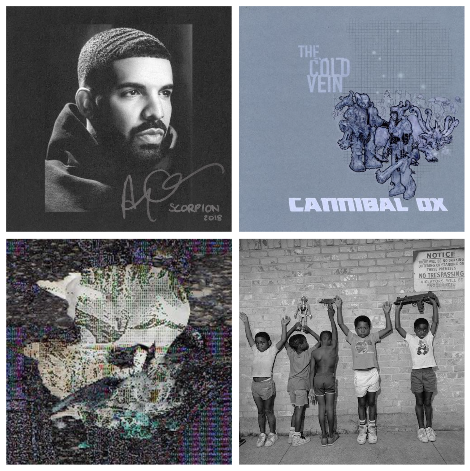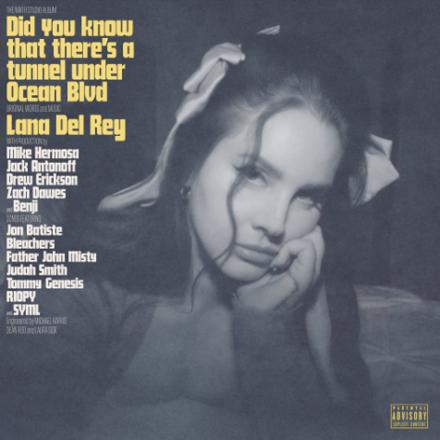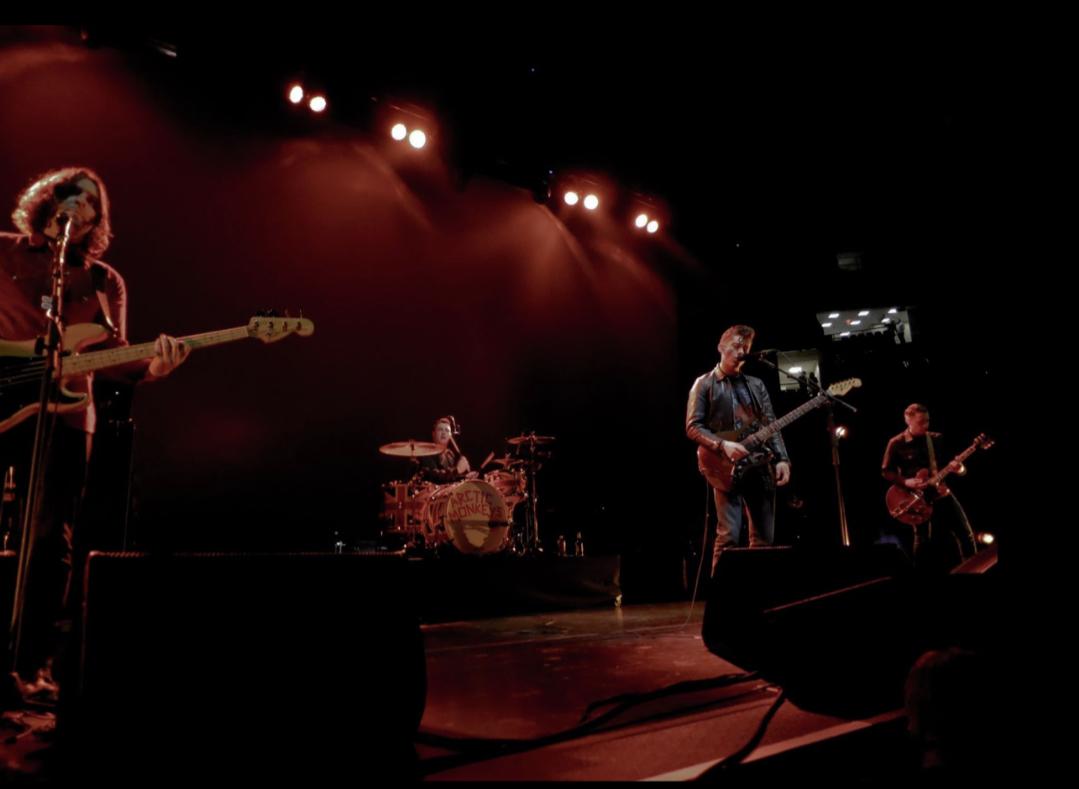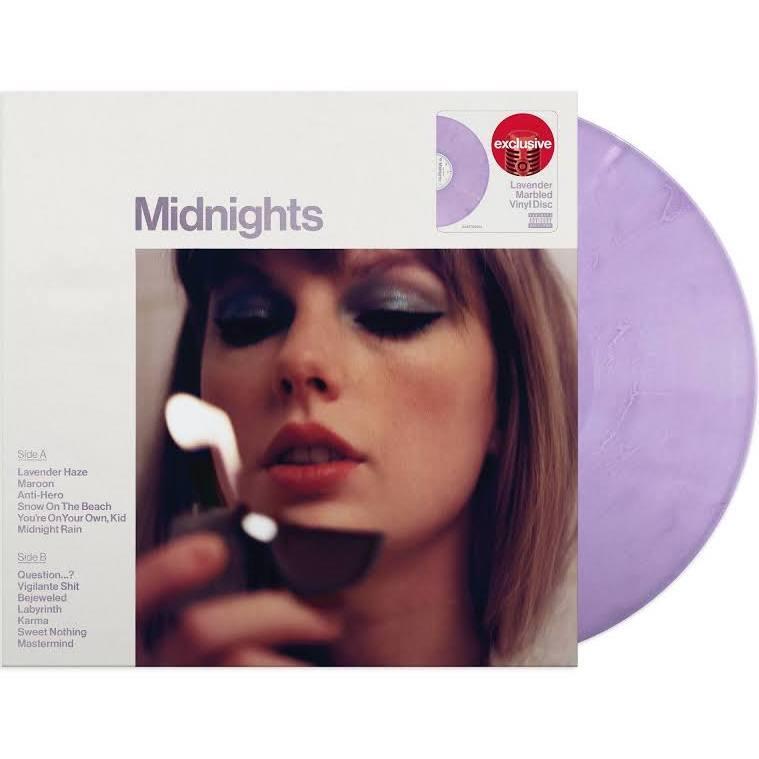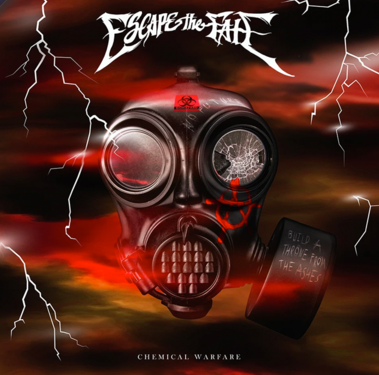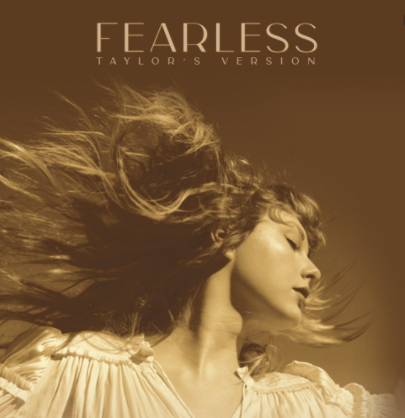Opinions belonging to Luke Hobika
Scorpion by Drake
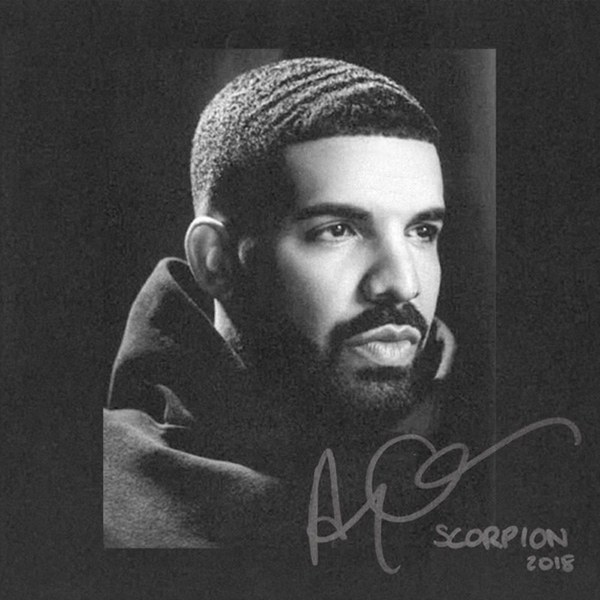
3.81/10
Best tracks: “Can’t Take a Joke;” “Summer Games;” “Nice For What” (don’t care about the popularity. This song is fantastic);
Worst tracks: “Nonstop;” “Talk Up” (the mixing on this is HORRENDOUS); “Peak;” “Ratchet Happy Birthday”
Drake’s Scorpion is a car that cannot start its engine at the car show, a fire that cannot light in times of survival, a magical act that fails to impress while being performed in front of the masses.
It’s an album that had plenty of opportunities to skyrocket to success, but sacrifices that chance in exchange of a prolonged tracklist that presents nothing that Drake hasn’t done already throughout his career. The sporadic pacing further pushes this album away from maintaining any cohesiveness. One track is classy Drake, the next is mobster Drake, then a somber Drake follows, only to be preceded by classy Drake once again. On several occasions, Drake’s musical decisions are seriously questionable. For instance, who in the sound room thought that it was a good idea to include “Ratchet Happy Birthday,” or to attempt to make a Thank Me Later rip-off on “Peak?” As far as lyrics and production go, it can be said that the material on here is a step down for Drake. With the lyrics, the same old Drake with his corny punchlines is ever so present. Yet, the line about “hanging with Future but still reminiscing” was quite clever. But, bars like “My mother had a flower shop, but I’m Sandra’s rose” or “Yeah, I’m light-skinned, but still a dark n***a.” Also, throughout many instances on the first disc of the album, the cheap-sounding trap drums of a plethora of tracks bring up the question of if this album was made on one of those free production apps on the App Store, specifically on “Nonstop.” Even worse, “Nonstop” consists of Drake with one of his most MONOTONOUS flows to date. Additionally, a person with poor hearing could point out that the mixing on this album is atrocious. The demo-quality “Survival” and messy mastering of “Talk Up” are truly a joke to my ears. However, the one this that this album does get right is the color on the cover, which accurately reflects its overall blandness and underwhelming tone.
The Cold Vein by Cannibal Ox
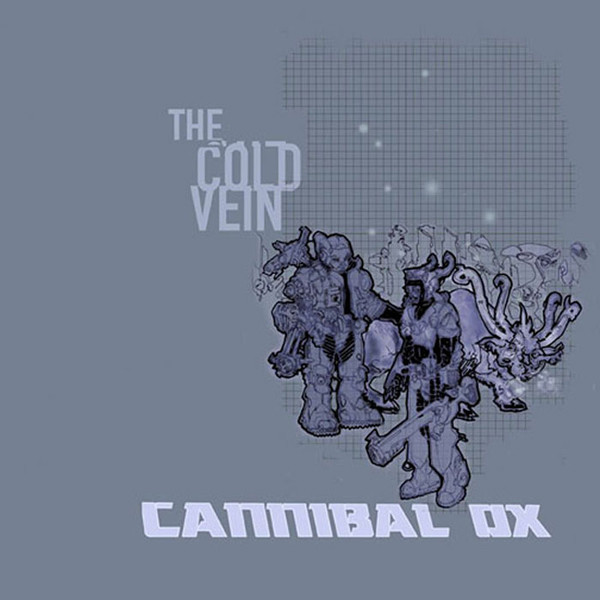
9.49/10
Best tracks: “Iron Galaxy;” “A B-Boys Alpha;” “The F-Word” AMAZING; “Painkillers”
Worst tracks: “Ridiculoid”
Along with El-P and his murky percussion that will give you a concussion, Vast Air and Vordul Mega collaborate on The Cold Vein to explain the true horrors that infest themselves within the streets of New York. At the time of its release, the music industry was saturated with the Y2K trend, yet the group Cannibal Ox go against the grain here with some of the most experimental, unembellished sound and messages in music.
The mind-bending, acrobatic, intelligent wordplay on this project relates to the struggles of the people within the urban areas of New York City. A life full of running in circles around an eerie homelife, going nowhere fast because of the corruption embedded within the economic practices. The instrumentals of the album only add to its eeriness. There is a futuristic quality that accompanies the production choices, yet a quality that hints at the downfall of humanity rather than a utopia. The lyricism and production are so thick, I am 110% certain that in the year 3030 I will still be dissecting this album.
NASIR by Nas

5.61/10
Best tracks: “Cops Shot the Kid;” ‘White Label;” “Adam and Eve”
Worst tracks: “Bonjour;” “everything”
Screw the music business. Since Nas’s Life is Good back in 2012, the hip hop community has been patiently waiting for another promised project. After almost six years of slight references to a new album, Nas scrapped the music associated with that project, only to join Kanye West’s recent musical campaign. Each week, one artist has released a project that includes production by Kanye himself and mixing by Mike Dean. On June 15th, 2018, we received NASIR. The recurring theme of the album is the lack of recognition the black community receives when discussing accomplishments made within our world. The concept is an absorbing topic to say the least, yet the execution through music resembles mixing oil with water. I find that it is seldom that there is a moment on this album where the chemistry between Kanye’s soul-sampled trap production and Nas’s conceptual and introspective messaging is intense enough to deliver a satisfying product. Now, the “Children’s Story” sample on “Cops Shot the Kid” was an acception to that statement, for the instrumental fit well with Nas’s delivery and message. In addition, the rock-infused piano line of “Adam and Eve” is reminiscent of the production themes of Life is Good, a project where Nas shined. For the most part, the instrumentals are either dragging Nas along or Nas is overshadowing the production. “Not for Radio” includes obnoxious adlibs courtesy of Puff Daddy, and the minimalistic instrumental of “everything” has no choice but to highlight Kanye’s crooning vocal contribution, which took away from Nas’s overall purpose on the track. Screw the music industry. Since the release of Nas’s Life is Good back in 2012, the hip hop community has been patiently waiting for another promised project. After almost six years of slight references to a new album, Nas scrapped whatever he had planned to join Kanye West’s recent musical campaign. Every Friday of the months of May and June, artists associated with West have released projects with West taking the role of producer. On June 15th, 2018, we received NASIR. The recurring theme of the album is the lack of recognition the black community receives when discussing accomplishments made within our world. The concept is an absorbing topic, to say the least, yet the execution through music resembles mixing oil with water. There seldom is a moment on this album where the chemistry between Kanye’s soul-sampled trap production and Nas’s conceptual and introspective messaging is compelling enough to deliver a satisfying product. Now, the “Children’s Story” sample on “Cops Shot the Kid” was an exception to that statement, for the instrumental fit well with Nas’s delivery and message. In addition, the rock-infused piano line of “Adam and Eve” is reminiscent of the production themes of Life is Good, a project where Nas shined. For the most part, the instrumentals are either dragging Nas along or Nas is overshadowing the production. “Not for Radio” includes obnoxious adlibs courtesy of Puff Daddy, and the minimalistic instrumental of “everything” has no choice but to highlight Kanye’s crooning vocal contribution, which took away from Nas’s overall purpose on the track.
Death Grips by Death Grips

7.03/10
Best tracks: “Death Grips (Next Grips);” “Face Melter;” “Takyon”
Worst tracks: “Full Moon (Death Classic)”
The self-titled introductive project by the industrial hip hop trio, Death Grips, brings nothing but bombastic sounds across every moment they use. Ultimately, the sounds present on this debut mixtape would influence future releases. However, the mixtape itself for its time was a sample of what the group was capable of. This is proven true on the starting track, “Death Grips (Next Grips),” where MC Ride establishes that the vicious sound of the music they experiment with will infect the listener and eventually cause them to commit mass destruction. Ride’s hollers are backed up with a gritty guitar chord and beat that resembles the marching of boots, as if the listeners are becoming hypnotized.
The self-titled introductive project by industrial-hip-hop-trio Death Grips brings nothing but bombastic sounds and absurd lyricism. Ultimately, the sounds present on this debut mixtape would influence future releases. However, the mixtape itself, for its time, was a sample of the skills that the band was capable of bringing. This is proven true on the starting track, “Death Grips (Next Grips),” where MC Ride asserts that the vicious sound of the music they experiment with will infect the listener and eventually cause them to lose control of themselves. Ride’s hollers are backed up with a gritty guitar chord and beat that resembles the authoritative marching of boots. Also, the group furthers their experimental talents with sampling extraordinary sounds, such as the brash horns on “Face Melter,” as well as a Pink Floyd guitar riff sample on the narcotized “Where’s It At” (which would later show up on their future project Exmilitary.)
There’s no doubt that the album lacks any consistency, but that is understandable. Its sole intention is to pave a new road for the band’s radical yet distinguishable sound.
The Love Movement by A Tribe Called Quest
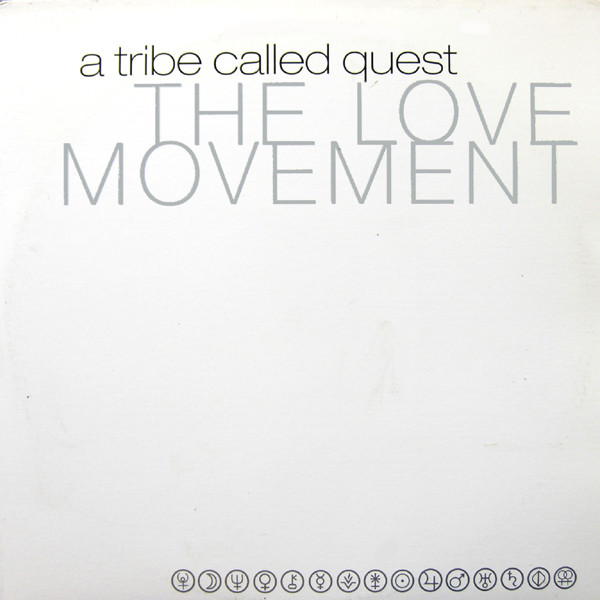
7.03/10
Best tracks: “Find A Way;” “It’s Like That;” “Common Ground (Get It Goin’ On);” “The Love”
Worst tracks: “Da Booty;” “Give Me;” “Hot 4 U”
At the start of their careers, Q-Tip, Phife Dawg, and Ali Shaheed Muhammad of respected hip-hop group A Tribe Called Quest cemented their unique style of jazz-rap into the overall rap genre. Now eight years later from their debut album, A Tribe Called Quest released their fourth studio album to the world, The Love Movement. All in all, the project shows a slim amount of faults. The issue with the album arises with the comparison of its sound to the sound of the hip-hop community at the time. Like their previous releases, the trio sticks to the familiar formula of jazz-influenced boom-bap beats. What may have been considered innovated a decade prior would be deemed obsolete in 1998. Additionally, the subject matter of the project draws a comparison to what the group is known for: spreading ideas of positivity. On this album, the term “love,” with its warm connotations, finds itself as the main subject. Again, a theme that runs parallel to those A Tribe Called Quest has experimented with in the past. The Love Movement is a safe album for the group that does not raise the expectations already set for the trio, nor does it detract from their overall imprint on the subject of music.





























